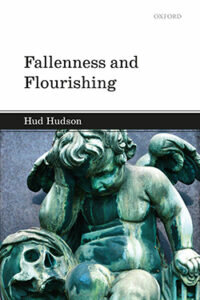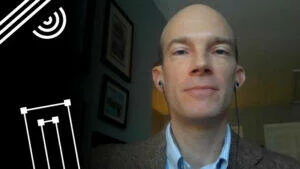I thoroughly enjoyed Hud Hudson’s Fallenness and Flourishing, for its philosophical quality but also for its deep insight into issues that relate to spiritual and moral formation. A slow and reflective reading on the nature of sloth as it is analyzed in the pages of this book would be potentially very useful for such purposes. This is moral philosophy and moral theology at its best, offering wisdom that can be lived.
Prior to reading Hudson’s book, I had never thought of obedience to God as a virtue. Rather, I just thought of it as a description of discrete actions done in accord with the will of God, connected to other virtues, but not a virtue in itself. Yet I think Hudson has made a strong prima facie case for understanding obedience as a virtue. Hudson conceives of obedience as “an abiding and deeply seated pro-attitude towards uniting one’s will with God’s will and a robust and stable set of dispositions aimed at combatting . . . our perpetual state of concupiscence which is daily fueled by self-love . . . self-deceit . . . the lesser goods of pleasure, knowledge, and power in the world.” It includes the positive “disposition to commit oneself to God’s revealed word by faith, to persevere in the hope for the realization of the promises of that word, and to promote that realization in the exercise of charity through properly grounded love of God and neighbor” (pp. 162–63). I will explore some ways in which the virtue of hope has potentially powerful roles to play in support of the virtue of obedience.
I will employ but not defend a particular understanding of hope as a theological virtue. According to Josef Pieper, “Hope is the confidently patient expectation of eternal beatitude in a contemplative and comprehensive sharing of the triune life of God; hope expects from God’s hand the eternal life that is God himself.”Josef Pieper, Faith, Hope, Love (San Francisco, CA: Ignatius Press, 2012), 103. This patient expectation assumes belief that what we expect in hope will actually come to pass. But we need more than belief, we also need desire. William Mattison observes that “hope is a longing for a good that is future and possible yet difficult.”William C. Mattison III, “Hope,” in Being Good, eds. Michael W. Austin and R. Douglas Geivett (Grand Rapids, MI: Eerdmans, 2012), 110. God is both the source and goal of hope, understood as a Christian virtue. In hope we long for union with God, and for God’s help in attaining and subjectively experiencing that union. Pieper’s “patient expectation” is important, but we must add the notion of desire, of Mattison’s “longing” for a fuller conception of Christian hope. Eternal beatitude is not just something we patiently wait for, it is also something we want. Hope looks forward, with longing, to a more fully experienced union with God, to sharing in the loving life of the Trinity with others who also enter into that life. This is a future good, but also a difficult one as those who receive it must endure suffering, epistemic (and other forms of) distance from God and others, and the many forms of evil that are present in this world. Yet hope remains. In what follows, I will examine some important ways that hope can and ought to play in relation to Hudson’s four components of obedience: humility, restraint, response, and love.
God is both the source and goal of hope, understood as a Christian virtue. In hope we long for union with God, and for God’s help in attaining and subjectively experiencing that union.
We begin with the humility component of obedience. Humility is a fairly complex virtue, with a variety of cognitive, affective, and active elements.See Michael W. Austin, Humility and Human Flourishing (New York: Oxford University Press, 2018). In my view, the humble person, among other things, has self-knowledge about her limitations, has a prima facie preference that the interests of others be satisfied over her own, is motivated to act by love of God, and is disposed to engage in self-sacrificial actions for the good of others. If this is right, hope intersects with obedience in a variety of ways. One way that hope can foster growth in obedience is by helping us grow in humility. Both the beliefs and longings of hope arguably foster humility. If I believe that communal eternal beatitude has infinite or ultimate value, and long for that reality, then I will be more disposed to be humble. If my hope is in beatitude, and I understand the nature of this communion, I will see my need for God’s help, necessarily, to enter into that beatitude. This is part of humility, an awareness of my limits and my need for God’s help. If I am reflective or sensitive enough, I can then see that these same lessons apply to my efforts at exemplifying God’s love in the here and now. In this way, hope can awaken us to the reality of our limits, and our need for God. This, in turn, can awaken us to our need for humility, and motivate us to more fully pursue this aspect of obedience.
Christians have a hope that we will see the goodness of God not only in the afterlife, in the new heavens and the new earth, but now, in the land of the living, as the Psalms remind us (Pss 23:6; 27:13–14). Our hope in the great goods of communion with the Trinity and with others who are also a part of that community can aid in obedience. One way it does this is through supporting the restraint component of this virtue, which has to do with restraining (or moderating) our inclinations to value and pursue lesser goods, placing our interests before the interests of others, and engaging in various forms of hypocrisy. Our hope in the aforementioned greater goods helps obedience restrain us from following our inclinations to pursue inferior goods. Some of those goods have more value than others. Marriage, friendship, living for a good cause (e.g., some ideal of justice) are more worthwhile than wealth, status, or fame. Yet it is a mistake to place one’s hope in any of these things because we should not hope in finite goods for our ultimate and complete happiness and fulfillment. Only God can satisfy us ultimately and completely. The virtue of hope orients us, both cognitively and affectively, to the more valuable (in some cases, infinitely so) goods. The result of this is that our inclinations to value and pursue lesser goods are restrained in obedience, but it is a restraint fueled in part by hope. Hope’s belief about the value of communion with God and others helps us to be properly oriented, in a cognitive sense, to these great goods. Hope’s longing can undermine the longings for lesser goods by replacing such longings with those directed at God, love, and the Trinitarian divine-human community.
The virtue of obedience also has a response component, which includes a disposition to respond in appropriate ways to the demands of love with respect to God and neighbor. This works contrary to the vice of sloth and its resistance to love’s demands. The cognitive and affective dimensions of hope, connected to our eternal beatitude, can engender such responsiveness to the demands of love. It seems to me that the affective component of hope is especially relevant here. If in hope I deeply desire the goods of union with the Trinitarian community of love, if that is where large portions of my heart are, so to speak, then it is more likely that I will be responsive to the demands of love in this life. If I place my hope in my future participation in a community with love at the center, then I will want to partially realize the love of that community in this life by how I relate to God and my neighbor. As Hudson notes, this is all a matter of degree, but it would be a strange moral psychology in which one values and desires participation in this Trinitarian community, in which one hopes for it, but yet consistently and strongly resists love in the here and now. Exemplifying such a moral psychology is both possible and perhaps actual, given human nature. But the point here is that the more robust one’s hope, the more likely it is that one will be responsive to love’s demands.
The more robust one’s hope, the more likely it is that one will be responsive to love’s demands.
Hudson’s final component of the virtue of obedience is love, which he defines as a pro-attitude related to exercising the will in ways that foster union with God. Hope can support this pro-attitude. The longing for sharing in the loving triune life of God would support the pro-attitude in question. If one’s hope is ultimately directed at union with God, then this would help motivate the will to make choices that foster that union now. Hope’s patient expectation, its belief, would also support this pro-attitude. Hope believes in the value and reality of love in eternal beatitude. It should motivate the agent to value the union with God that can be experienced in this age, and contribute to the will choosing courses of action that foster that union.
I would suggest that hope might in some ways be among the necessary conditions for having the virtue of obedience.For suggestions about how to cultivate the virtue of hope, see Mattison, “Hope.” At the least, it has a very potentially fruitful role to play, insofar as it is directly connected to and able to “nourish and strengthen” the virtue of obedience in the ways I have briefly described here. And if hope is potentially fruitful in helping one to cultivate and exemplify obedience in these and other ways, then it would be wise to intentionally cultivate it.








Comments
Be the first one to make a comment!